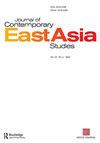Comprehensive law-based governance in China? Legislating authoritarianism in the Xi Jinping era
IF 1.4
Q1 AREA STUDIES
引用次数: 0
Abstract
ABSTRACT The survival of authoritarianism has become an important issue in comparative political studies in recent years. Apart from power sharing within the ruling group and the relationship between the state and society, the focus is also on how authoritarian regimes consolidate their power through “rule by law.” By analyzing and comparing various legislative data in China, this study finds that the CCP did become more proactive in its legislation during the Xi period. There was a rapid increase in the number of bills, faster deliberation, and a shift in the major drafting authorities from the former State Council to the National People’s Congress (NPC) and specific party-state institutions. In this regard, comprehensive law-based governance strengthens rule by law rather than the rule of law. A revision of the Organic Law of the NPC [《人大組織法》, Renda Zuzhi Fa] in 2021 increased the power of the NPC Standing Committee (NPCSC), and legislation was made more flexible and efficient. The law also strengthened the consolidation of the legislating authoritarian regime.全面依法治国?
威权主义的生存是近年来比较政治研究中的一个重要问题。除了统治集团内部的权力分享和国家与社会的关系之外,独裁政权如何通过“法治”巩固权力也是关注的焦点。法案数量迅速增加,审议速度加快,主要起草机构从原国务院转移到全国人民代表大会和特定的党国机构。因此,全面依法治国是加强法治,而不是加强法治。2021年修订的《全国人大组织法》增加了全国人大常委会的权力,使立法更加灵活和高效。该法律还加强了立法专制政权的巩固。
本文章由计算机程序翻译,如有差异,请以英文原文为准。
求助全文
约1分钟内获得全文
求助全文
来源期刊

Journal of Contemporary East Asia Studies
Social Sciences-Cultural Studies
CiteScore
2.50
自引率
0.00%
发文量
10
审稿时长
6 weeks
 求助内容:
求助内容: 应助结果提醒方式:
应助结果提醒方式:


